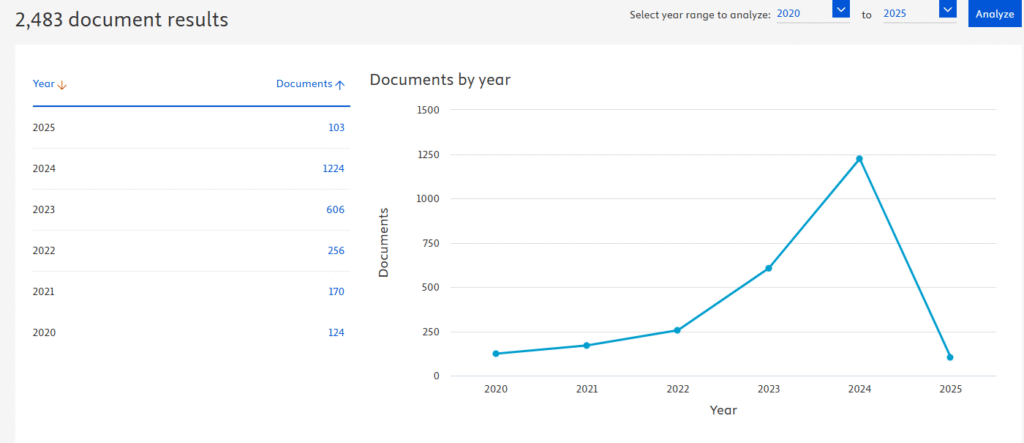Interest in artificial intelligence (AI) in education has skyrocketed in recent years. Data from Scopus shows a dramatic increase in publications on this topic between 2020 and 2025 , with early 2025 already nearly matching the total output of 2020. Most of this research comes from the social sciences and computer science fields, while business, management, and accounting have emerged as key areas of interest, particularly relevant for exploring AI’s role in managing higher education institutions.

Smarter Decision-Making Through AI
AI is no longer just something used to enhance classroom learning. It’s becoming a valuable tool for making better decisions in how universities are run. For example, Qian, Cao, and Chen (2025) developed a system called SEOM that uses a mix of machine learning algorithms and neural networks to allocate resources and recommend personalized learning paths. This model achieves impressive accuracy, between 85% and 97%, and is designed to work even in challenging environments with limited connectivity. It’s a promising direction, though implementing such systems at scale might require significant computational resources.
Along similar lines, Ab Rahman et al. (2025) reviewed 51 studies that apply machine learning to predict student performance. The goal is to improve early intervention, personalize support, and guide long-term planning. Techniques like Random Forest and neural networks are commonly used. But the authors also stress that ethical concerns, such as data bias and lack of transparency must be addressed if institutions want these tools to be truly beneficial and fair.
AI Policy and Governance in Universities
As tools like ChatGPT become more common, universities are under pressure to develop policies around their use. An, Yu, and James (2025) examined how the top 50 U.S. universities are approaching generative AI (GenAI). Their analysis revealed mostly positive attitudes, but also significant variation in the rules depending on the audience. For example, policies aimed at students tend to be more restrictive than those directed at faculty. The main themes they identified included the integration of GenAI in learning, its use in interactive media, ethical and safety considerations, and concerns about academic integrity.
On the other hand, Baig and Yadegaridehkordi (2025) looked at what motivates academic staff to adopt GenAI. Their findings show that trust, ease of use, technical support, and institutional backing are key to continued use. Interestingly, expected performance didn’t directly influence satisfaction, but it did shape future intentions, these insights are especially useful for institutions designing training programs or trying to increase AI adoption among staff.
Teaching the Skills to Use AI Effectively
The conversation around AI isn’t just about technology, it’s also about skills. Lee and Palmer (2025) examined how prompt engineering (the art of asking AI the right questions) is being taught in higher education. Their review found five major themes: skills, creativity, administration, frameworks, and prompt types. They argue that this skillset needs to be taught in a way that’s practical, reflective, and tailored to each academic field. This makes sense using AI well isn’t just about access to the tools, but knowing how to interact with them meaningfully.

AI and Sustainability: A Broader Perspective
Beyond productivity and personalization, AI can also support sustainability in higher education. Khan et al. (2025) explored how AI can help institutions reduce waste, streamline operations, and lower their environmental footprint. Their study points out that while the technology has potential, it also brings new challenges, such as data privacy risks and the danger of reinforcing existing inequalities. They emphasize the need for ethical frameworks that prioritize people, not just efficiency.
What does AI think of its role in higher education management?
I decided to ask the AI itself for its opinion and this is its answer:
“If AI could speak for itself, it might say its role is to “enhance, not replace” the human touch in education. From my perspective, AI is a powerful assistant—it helps surface insights from data, automate repetitive tasks, and make institutions more responsive to student needs. But it’s not a silver bullet. AI lacks empathy, context, and the values that shape great educational leadership. So while it can help manage higher education more effectively, real transformation will depend on how human decision-makers choose to use it—with care, responsibility, and a focus on equity.”
AI is rapidly becoming a cornerstone of both academic and administrative functions in higher education. From personalized learning models and predictive analytics to policy development and skill training, the evidence shows clear benefits, but also complex challenges. For institutions looking to implement AI responsibly, a balanced approach is needed: one that combines technical advancement with ethical foresight, policy clarity, and inclusive educational design.
References
Ab Rahman, N. F., Wang, S. L., Ng, T. F., & Ghoneim, A. S. (2025). Artificial Intelligence in Education: A Systematic Review of Machine Learning for Predicting Student Performance. Journal of Advanced Research in Applied Sciences and Engineering Technology, 54(1), 198–221. https://doi.org/10.37934/araset.54.1.198221
An, Y., Yu, J. H., & James, S. (2025). Investigating the higher education institutions’ guidelines and policies regarding the use of generative AI in teaching, learning, research, and administration. International Journal of Educational Technology in Higher Education, 22(10). https://doi.org/10.1186/s41239-025-00507-3
Baig, M. I., & Yadegaridehkordi, E. (2025). Factors influencing academic staff satisfaction and continuous usage of generative artificial intelligence (GenAI) in higher education. International Journal of Educational Technology in Higher Education, 22(5). https://doi.org/10.1186/s41239-025-00506-4
Khan, S., Mazhar, T., Shahzad, T., Khan, M. A., Rehman, A. U., Saeed, M. M., & Hamam, H. (2025). Harnessing AI for sustainable higher education: Ethical considerations, operational efficiency, and future directions. Discover Sustainability, 6(23). https://doi.org/10.1007/s43621-025-00809-6
Lee, D., & Palmer, E. (2025). Prompt engineering in higher education: A systematic review to help inform curricula. International Journal of Educational Technology in Higher Education, 22(7). https://doi.org/10.1186/s41239-025-00503-7
Qian, L., Cao, W., & Chen, L. (2025). Influence of artificial intelligence on higher education reform and talent cultivation in the digital intelligence era. Scientific Reports, 15, Article 6047. https://doi.org/10.1038/s41598-025-89392-4
